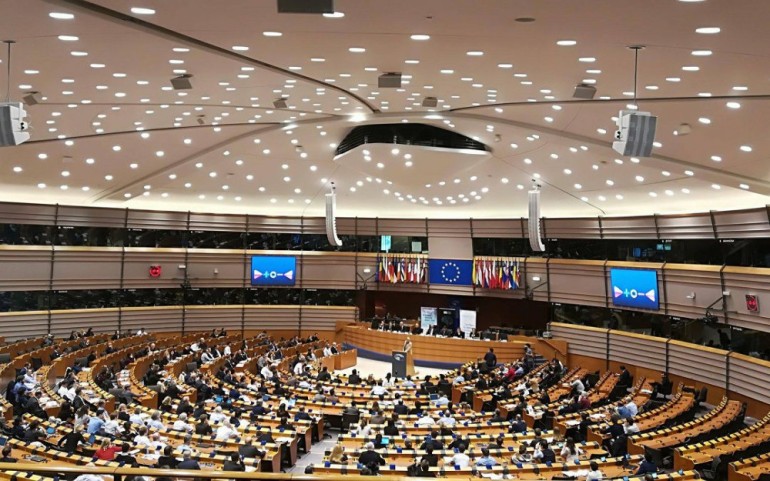The EU’s Game of Thrones, which will play out in the coming weeks, will be lacking in blood and sex, but will easily equal the TV series in complexity. Following the European Parliament elections that took place on May 23–26, EU leaders must now choose the next presidents of the European Commission, European Council, European Parliament, and European Central Bank (ECB) as well as a new EU foreign policy chief. Essentially, there will be three games running in parallel, but they will all have to come together in the end.
THE INTER-INSTITUTIONAL GAME
The first game is between the EU’s institutions. The European Parliament pulled off a constitutional coup in 2014 by imposing the lead candidate (known by the German term Spitzenkandidat) of the largest party group, Jean-Claude Juncker, as European Commission president. According to the EU treaties, it is the national leaders in the European Council who should propose a candidate to the parliament, “taking into account the elections.”
The main party groups, except the Liberals, would now like to build on this success and turn the Spitzenkandidaten model into a permanent rule for selecting the Commission president. Immediately after the 2019 elections, they adopted a statement asserting that the next Commission president should be one of the lead candidates. However, they did not rally behind the candidate of the biggest group, Manfred Weber of the European People’s Party (EPP), and they did not threaten to veto anyone else.
In the European Council, there are many who would like to bury the Spitzenkandidaten concept. They feel it gives too much influence to the parliament and unduly limits the choice of the best-qualified person for the job. But most wish to avoid an open confrontation with the parliament, which will in the end have to elect the commission president.
THE INTER-PARTY GAME
The second game involves the EU’s party groups. The biggest two, the center-right EPP and center-left Social Democrats, emerged from the 2019 elections significantly weakened. They no longer jointly have a majority in the parliament and will have to turn to other parties, particularly the Liberals or the Greens, to pass legislation. Still, the role of the two largest parties remains crucial, as there is neither a leftist majority against the EPP nor a credible rightist one against the Social Democrats.
Over the coming weeks the various factions will attempt to bring like-minded small groups into their fold. They will also seek to build a majority behind agreed candidates for the presidents of the commission and the parliament and a common policy platform.
The Liberals and Greens will try to make the most of their potential kingmaker role but risk being played off against each other. Whereas the Liberals will join the fight for the top jobs, the Greens will probably place their main emphasis on shaping the policy platform.
THE GAME OF THE LEADERS
The third game considers the slew of EU leadership roles together. Before the Spitzenkandidaten initiative was started, it was up to the European Council to put together a package of the EU’s top positions. Most heads of state and government would like to revert to this model.
In assembling such a package, leaders have to take several factors into account : party groupings, geographic distribution, big and small member states, members and non-members of the eurozone, and gender. Many believe that women should be better represented this time.
While not all member states will field candidates for these positions, everyone has a stake in the process. Some will try to leverage their support for a candidate to obtain a juicy dossier for their future European commissioner or promote other institutional interests. Others will try to make sure that the new leaders share their political or economic philosophy.
The latter consideration will be particularly important for French President Emmanuel Macron, who urgently needs partners for promoting his vision of a European renaissance. Macron has taken the lead of the group resisting Weber’s nomination and has already clashed with German Chancellor Angela Merkel, who is bound to support the EPP candidate. An eventual compromise will have to satisfy both Paris and Berlin, and could involve a trade-off between the two biggest jobs, commission president and ECB president.
HOW TO PLAY THREE-DIMENSIONAL CHESS
Ideally, the parliament would prefer to maintain the initiative. If it comes up with a candidate for commission president who has a majority of members of the European Parliament (MEPs) behind him or her, the European Council will have little choice but to accept the proposal. However, as the three biggest groups each have a prominent candidate with significant support, an early compromise will be hard to reach.
The European Council has tasked its outgoing president, Donald Tusk, to act as game master. He will start consulting with party representatives in the council and the parliament. His stated objective is to assemble an acceptable package in time for the European Council session on June 21. This timeframe appears ambitious, as the overall constellation of forces is more complex than ever before.
The real risk is that the multilevel institutional wrangling will distract from the true objective of the process : to bring together the most qualified personalities to lead the EU institutions in the next five years. With the decline of the old party machines, personal leadership, vision, and the ability to communicate have become essential qualities for the people at the helm of the EU’s institutions. The new leaders must be strong enough to confront bullying international actors. They need a reliable internal compass to steer through a turbulent and fragmented political scene, and they have to be able to explain what the EU is about and to rebuild public trust.
Outstanding personal qualities must therefore be the topmost consideration throughout the process. The union cannot afford to settle for second best.


